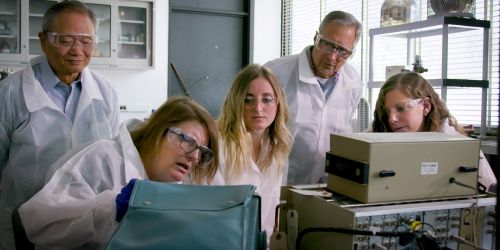
Physics (M.S.)
Pursuing a graduate degree in physics will give you more in-depth and specialized knowledge in the discipline, and help you build skills to work in an innovative field.
Illinois Tech is an excellent choice for graduate study in physics as the department is small, collegial, and collaborative. Research is organized into small groups of faculty members, postdoctoral associates, graduate students, and undergraduate students working closely on related projects. Classes are generally small and informal, and thesis research is carried out in close collaboration with the faculty adviser.
Faculty provide personal attention and support. At the same time, Illinois Tech is a major research institution with connections to Argonne National Laboratory, Fermilab, and global physics experiments such as Daya Bay. Major areas of research include particle and accelerator physics, condensed matter physics, superconductivity, biophysics, and computational biophysics. Faculty have special expertise in such areas as XAFS and synchrotron.
Program Overview
Illinois Tech is a major research institution with connections to Argonne National Laboratory, Fermilab, and global physics experiments such as Daya Bay. Research covers particle and accelerator physics, condensed matter physics, superconductivity, and computational biophysics. Faculty expertise includes XAFS and synchrotron.
Career Opportunities
Those with graduate degrees in physics are more likely to land jobs as researchers in public and private labs. Other fields physicists are employed in areas including medicine, energy, renewable energy, transportation, defense, and telecommunications.
- Accelerator Operator
- Data Analyst
- Lab Technician
- Laser Engineer
- Optical Engineer
- Research Associate
- Software Developer
Admission to Illinois Tech is required to enroll in the Master of Science in Physics program. Consult your academic adviser to transfer into the program.

